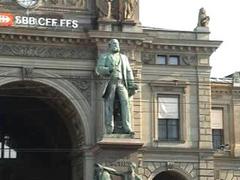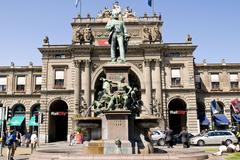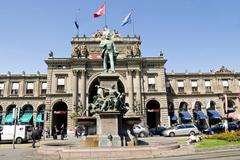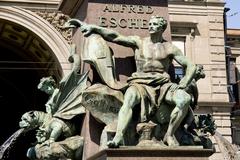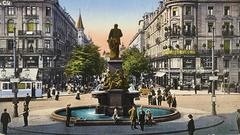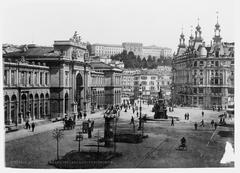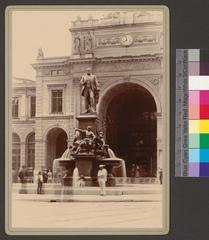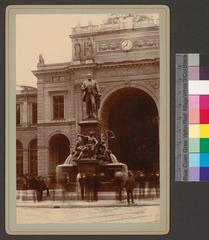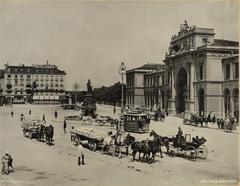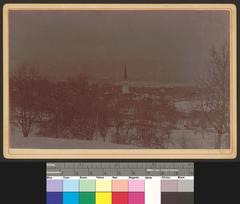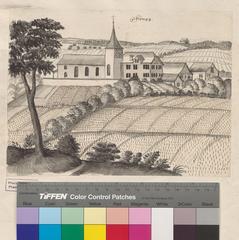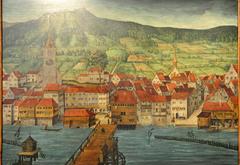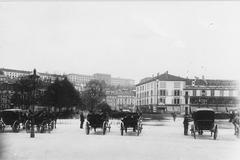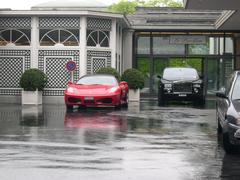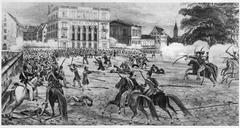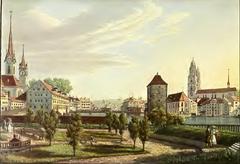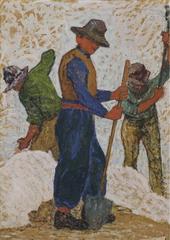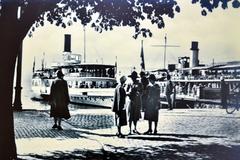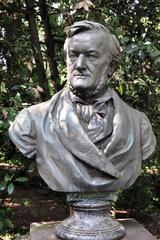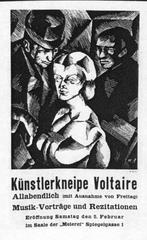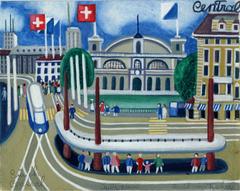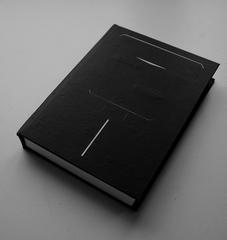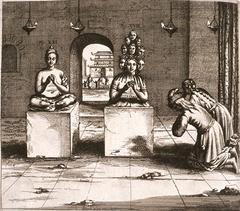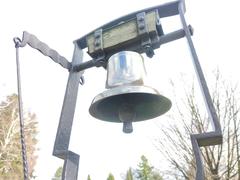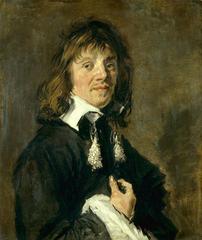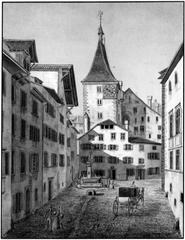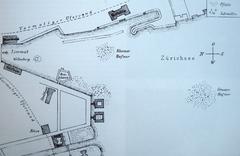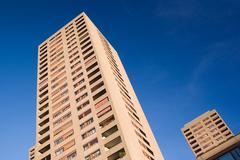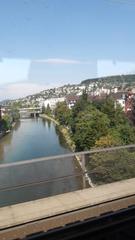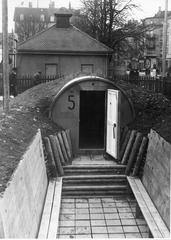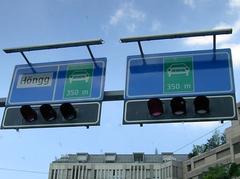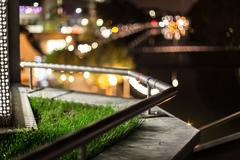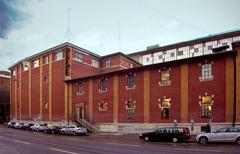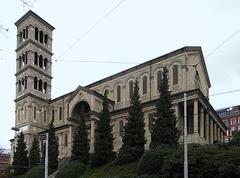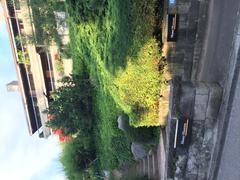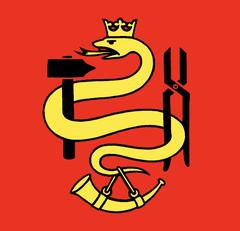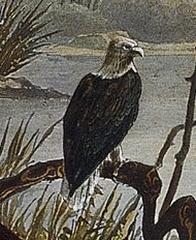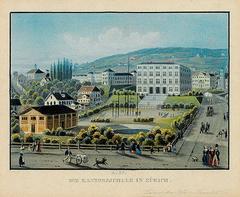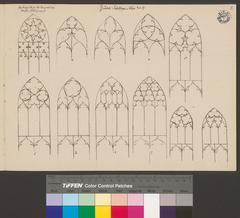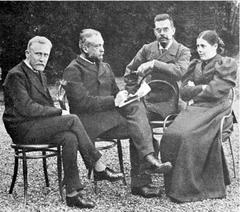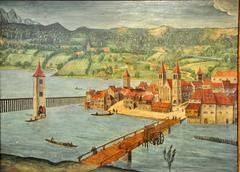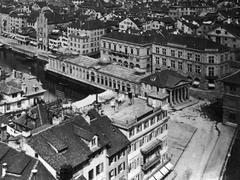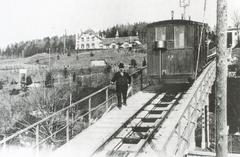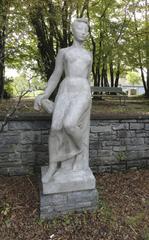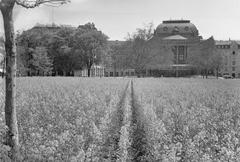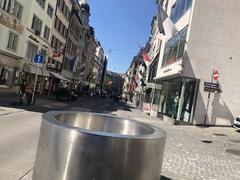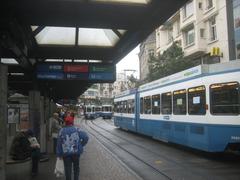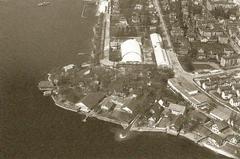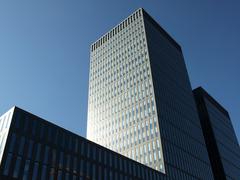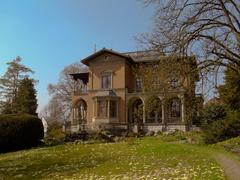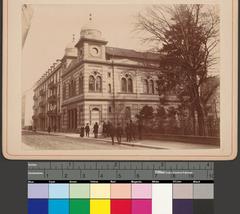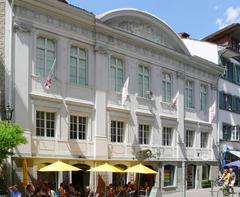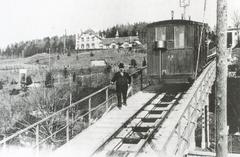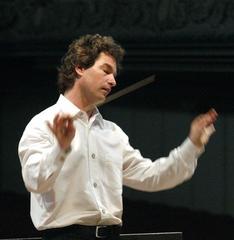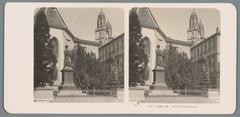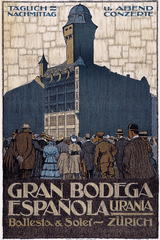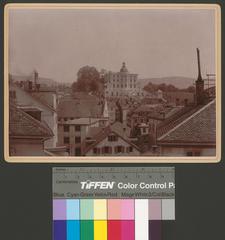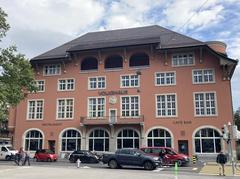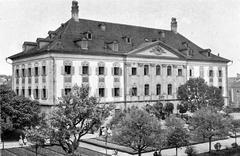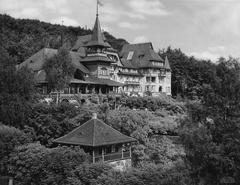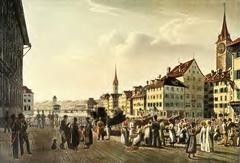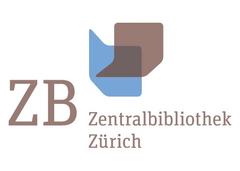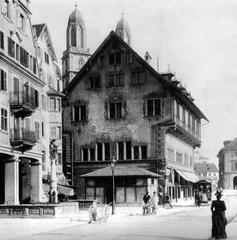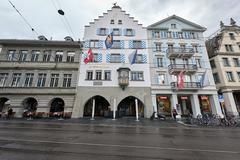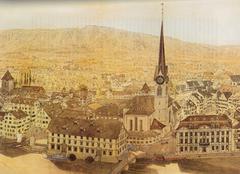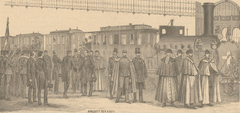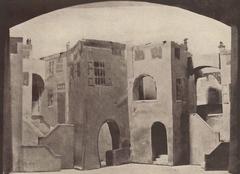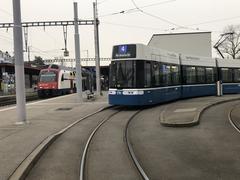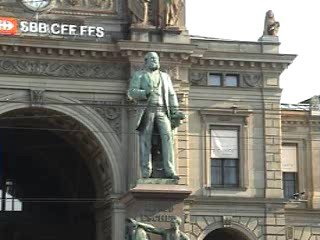
Alfred Escher Memorial Fountain: Visiting Hours, Tickets, and Travel Guide in Zürich
Date: 14/06/2025
Introduction
Located at Bahnhofplatz directly in front of Zürich Hauptbahnhof, the Alfred Escher Memorial Fountain is a defining landmark that celebrates the life and legacy of one of Switzerland’s most influential 19th-century statesmen. Alfred Escher was instrumental in shaping the nation’s railway infrastructure, founding key institutions like ETH Zürich and Credit Suisse, and spearheading Switzerland’s economic modernization. This comprehensive guide provides detailed insights into the history, cultural significance, visitor experience, and practical information needed to plan a memorable visit to this must-see Zürich attraction. For additional resources, consult official sites and articles such as Zürich.com, House of Switzerland, and Evendo.
Table of Contents
- Discover the Alfred Escher Memorial Fountain: History and Significance
- Visiting Information: Hours, Access, and Admission
- Getting There and Accessibility
- Nearby Attractions and Cultural Context
- The Story of Alfred Escher: Biography and Legacy
- Monument Details and Symbolism
- Guided Tours and Special Events
- Visitor Tips
- Frequently Asked Questions (FAQs)
- Summary and Recommendations
- Sources and Further Reading
Discover the Alfred Escher Memorial Fountain: History and Significance
The Alfred Escher Memorial Fountain stands as a tribute to Alfred Escher’s transformative role in Switzerland’s evolution into a modern nation. Born in Zürich in 1819, Escher rose from a privileged family background to become a leader in politics, business, and education. His vision led to the development of Switzerland’s railway network, the construction of the Gotthard Tunnel, and the founding of institutions that continue to shape the country’s prosperity today (Zürich.com, House of Switzerland). The fountain, created by sculptor Richard Kissling and inaugurated in 1889, highlights these achievements through its artistic symbolism and central location.
Visiting Information: Hours, Access, and Admission
- Visiting Hours: The Alfred Escher Memorial Fountain is outdoors and accessible 24 hours a day, year-round. The water features typically operate from spring through autumn.
- Admission: There is no entrance fee or ticket required; visiting the fountain is entirely free.
Getting There and Accessibility
Location
- Address: Bahnhofplatz, 8001 Zürich, Switzerland
- GPS Coordinates: 47.3782° N, 8.5402° E
Public Transportation
The fountain is directly in front of Zürich Hauptbahnhof, the city’s main railway station, which is easily reached via local, regional, and international trains. Several tram lines (including 4, 6, 10, 13, and 17) and buses also serve Bahnhofplatz (zuerich.com), ensuring convenient access from anywhere in the city.
Walking and Cycling
Bahnhofplatz is pedestrian-friendly, with wide paved paths, and bike parking is available nearby. Many of Zürich’s central attractions can be reached on foot from the memorial.
Accessibility
The area is designed for full accessibility. Wheelchair users benefit from curb cuts, tactile paving, ramps, and accessible public transit. Zürich Hauptbahnhof is equipped with elevators and accessible restrooms (zuerich.com).
Parking
Due to the central location, parking is limited. The closest garages are Parkhaus Hauptbahnhof and Parkhaus Urania, both within a 5–10 minute walk. Public transport is recommended.
Nearby Attractions and Cultural Context
The Alfred Escher Memorial Fountain’s prime location provides easy access to several of Zürich’s top historical and cultural landmarks:
- Zürich Old Town (Altstadt): Medieval alleys and historic squares, a short walk away.
- Bahnhofstrasse: Zürich’s premier shopping boulevard, starting at Bahnhofplatz.
- Swiss National Museum (Landesmuseum Zürich): Exhibits on Swiss cultural history, just north of the station (hauntsofmyancestors.wordpress.com).
- Grossmünster Church: Iconic twin-towered landmark.
- ETH Zürich: Switzerland’s leading technical university, easily reached by tram.
Cafés, restaurants, and shops line the area, making it an ideal spot to pause and soak up Zürich’s vibrant urban atmosphere.
The Story of Alfred Escher: Biography and Legacy
Early Life
Alfred Escher was born into the Escher zum Glas family, which had significant influence in Zürich since the 16th century. His father’s rebuilding of the family fortune allowed Alfred to grow up in privilege, living at Villa Belvoir (Moonshot Insights).
Political and Economic Achievements
- Entered Zürich’s cantonal parliament at age 25 and became the youngest member of the Swiss National Council by 27 (Zürich.com).
- Developed the Swiss Northeastern Railway and led the construction of the Gotthard Tunnel, completed in 1882, revolutionizing European trade and transit (Zürich.com).
- Founded ETH Zürich in 1855, Credit Suisse in 1856, and Swiss Life, fundamentally shaping Switzerland’s educational and financial sectors (Wikipedia).
Legacy
Despite personal tragedies, including the early loss of his wife and daughter, Escher’s legacy is visible throughout Zürich and the nation. His contributions to infrastructure, education, and finance continue to influence Swiss society today (Wikipedia).
Monument Details and Symbolism
Artistic Composition
- Central Figure: A bronze statue of Alfred Escher in dignified 19th-century attire, holding a rolled document to symbolize his work in infrastructure and public life (swissinfo.ch).
- Sculptor: Richard Kissling, renowned for expressive realism.
- Pedestal and Basin: The statue stands atop an octagonal granite pedestal surrounded by a circular basin with water outlets, adding movement and tranquility.
Allegorical Figures
At the base, four bronze figures represent Escher’s achievements:
- Railways: A male figure with a hammer and rail.
- Trade and Industry: A female figure with a caduceus and gear.
- Education: A youth with a book and compass, referencing ETH Zürich.
- Gotthard Tunnel: A miner with a pickaxe.
Detailed reliefs and inscriptions further narrate Escher’s life and impact.
Guided Tours and Special Events
While dedicated tours for the fountain are rare, many city walking tours include it as a key stop. Audio guides and mobile apps like Audiala offer additional context. The memorial is sometimes the site of commemorative events, especially on anniversaries related to Escher or the Gotthard Tunnel (House of Switzerland, Evendo).
Visitor Tips
- Photography: Best light is in the early morning or late afternoon.
- Crowds: The plaza is busiest during rush hours; visit off-peak for a more tranquil experience.
- Safety: Watch for trams and keep an eye on personal belongings.
- Amenities: Restrooms and tourist information are available inside Zürich Hauptbahnhof.
- Language: Information plaques are in German; English is widely spoken in the area.
Frequently Asked Questions (FAQs)
What are the visiting hours?
The memorial is outdoors and accessible 24/7; water features operate seasonally.
Is there an admission fee?
No, visiting the Alfred Escher Memorial Fountain is free.
Are guided tours available?
Yes, many Zürich walking tours include the fountain, and self-guided audio tours are accessible via mobile apps.
Is the site wheelchair accessible?
Yes, the area is fully accessible, with ramps, tactile paving, and nearby accessible public transport.
Can I park at the fountain?
Parking is limited; use public transport or nearby garages.
Summary and Recommendations
The Alfred Escher Memorial Fountain is a living emblem of Zürich’s spirit of progress, civic pride, and historical continuity. Freely accessible at the heart of the city’s transportation hub, the monument eloquently encapsulates Escher’s visionary contributions—from the Gotthard Railway to the founding of ETH Zürich and Credit Suisse. Surrounded by cultural and historical landmarks, the fountain offers visitors an enriching blend of art, history, and urban life. For an enhanced experience, consider joining a guided tour, using an audio guide app, or exploring nearby attractions like the Swiss National Museum and Bahnhofstrasse. Stay informed about seasonal events and commemorations through official tourism channels, and consult reputable resources for the most up-to-date visitor information.
Sources and Further Reading
- Alfred Escher Memorial Fountain in Zürich: Visitor Guide, History, and Significance, 2025, Zürich Central Library (https://www.zb.uzh.ch/en/zuerich/alfred-escher)
- Alfred Escher Memorial Fountain in Zürich: Visitor Guide, History, and Significance, 2025, Moonshot Insights (https://moonshot.ch/insights/alfred-escher-architect-of-swiss-economy/)
- Alfred Escher Memorial Fountain in Zürich: Visiting Hours, Tickets, and Historical Highlights, 2025, Zürich.com (https://www.zuerich.com/en/alfred-escher)
- Alfred Escher Memorial Fountain in Zürich: Visiting Hours, Tickets, and Historical Highlights, 2025, swissinfo.ch (https://www.swissinfo.ch/eng/culture/alfred-escher-_when-switzerland-had-its-own-king/41776240)
- Alfred Escher Memorial Fountain in Zürich: Visiting Hours, History, and Travel Tips, 2025, House of Switzerland (http://houseofswitzerland.org/swissstories/history/alfred-escher-visionary-modern-switzerland)
- Alfred Escher Memorial Fountain in Zürich: Visiting Hours, History, and Travel Tips, 2025, Evendo (https://evendo.com/locations/switzerland/zurich/attraction/alfred-escher-statue)
- Visiting the Alfred Escher Memorial Fountain in Zürich: Hours, Accessibility & Nearby Attractions, 2025, Zürich.com (https://www.zuerich.com/en/visit/attractions/alfred-escher-statue)
- Visiting the Alfred Escher Memorial Fountain in Zürich: Hours, Accessibility & Nearby Attractions, 2025, ADAC Maps (https://maps.adac.de/poi/alfred-escher-denkmal)
